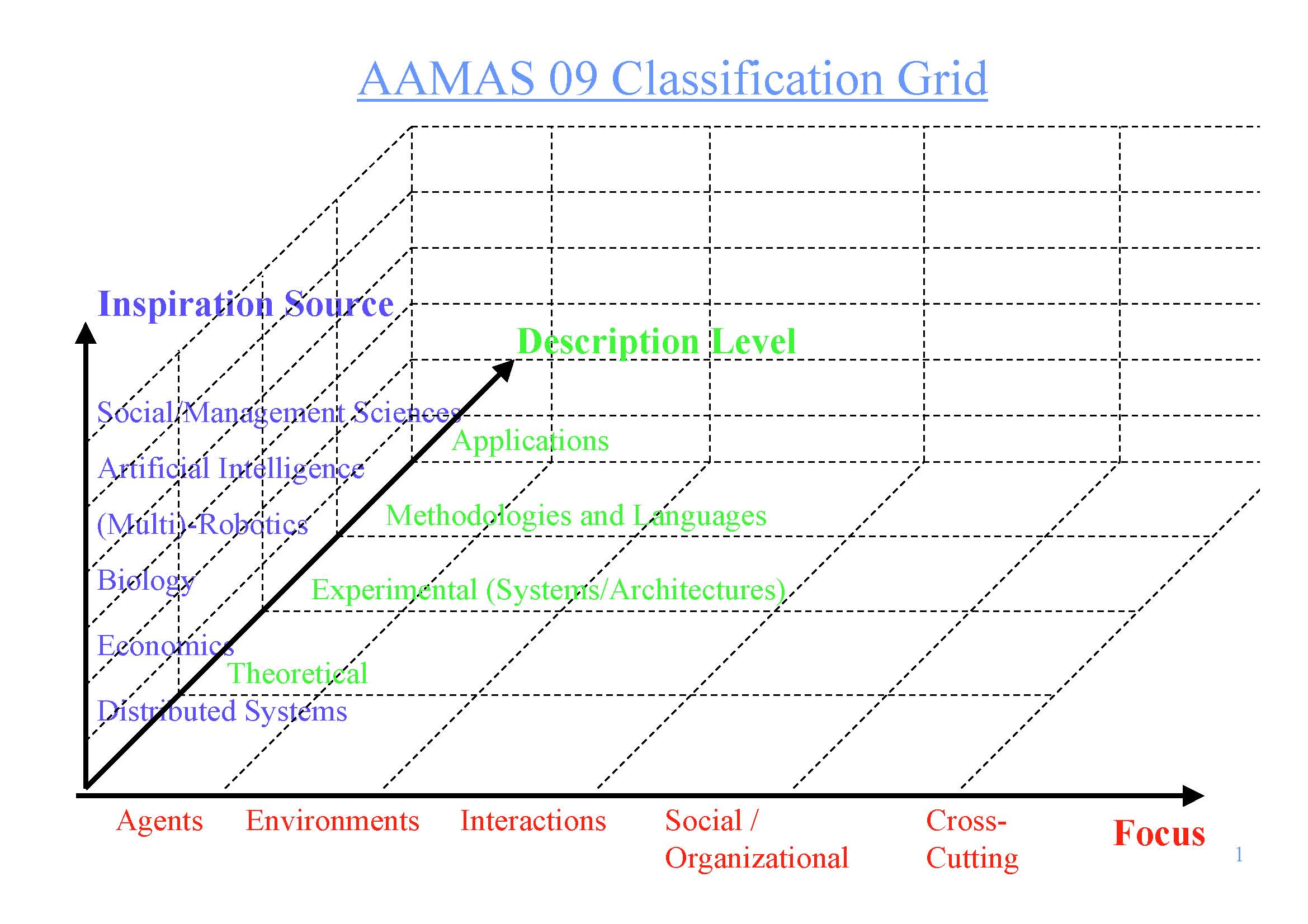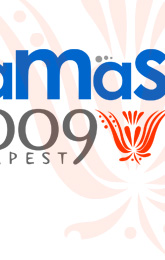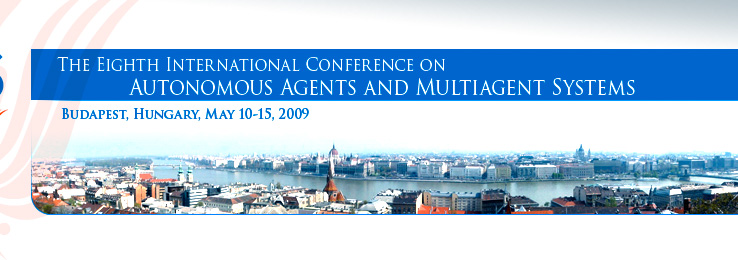AAMAS 2009 encourages the submission of *original* papers covering theoretical, experimental, methodological, and application issues in autonomous agents and multiagent systems. Authors are discouraged to submit papers describing work that has already been published in previous AAMAS workshops with post-proceedings publications and/or published as short papers in previous AAMAS proceedings, unless that the authors *clearly* demonstrate significant new content with respect to the previous publication.
The main theme of AAMAS 2009, based on feedback from previous conferences, will be reinforcing the rich panorama of *interconnections* in the field. We encourage the community, and the authors in particular, to reflect about their work not as belonging to just a niche in a long list of topics, but rather as a point in an abstract topological space defined by three complementary axes:
(i) the *focus* of the work, i.e., what is the AAMAS topic or contribution of the work
(ii) the *description level*, i.e., whether this contribution is mostly in the theoretical / architectural / applicative level
(iii) the intellectual *inspiration source*, i.e., what scientific domain has given the main ideas for the contribution
Additionaly, the *description level* and *inspiration source* axes will be used in the reviewing process. The first one points out how ideally should your paper be evaluated and the second indicates what kind of scientific background is best for people who review your paper.
Every paper will be evaluated appropriately with respect to each of these three axes. Moreover, the use of this topological space will help this year and future AAMAS conference organizers to better stress some particular points in this space to be highlighted in the program, as it was the case of the special tracks presented in AAMAS 2008 and will be the case of the special area tracks in AAMAS 2009.

DESCRIPTION LEVEL AXIS
AAMAS 2009 encourages the submission of papers in several descriptive styles:
(i) theoretical,
(ii) experimental/empirical (architectures/systems/simulations/data analysis),
(iii) methodologies/languages (design/software engineering/programming language-oriented), and
(iv) applications.
Every paper should make clear its contribution to the AAMAS field, place itself in the context of relevant related work, and evaluate the strengths and weaknesses of its approach.
Theoretical papers should make clear the significance and application-relevance of the results to the AAMAS community.
Experimental / Empirical papers should address issues clearly in the context of autonomous agents or multi-agent systems architectures, simulations, or performance.
Methodological and language papers should propose advances in MAS analysis/design methodologies, process and process models for agent-oriented software development, frameworks for MAS specific properties (like cooperation, coordination etc...), agent verification and validation techniques/tools, and multi-agent programming languages, deployment platforms and development tools.
Application papers should provide a motivation for why an agent- or multi-agent approach was used, a clear description of the design and implementation of the system, and a thorough evaluation of the system.
INSPIRATION SOURCE AXIS
AAMAS-09 welcomes papers from many intellectual approaches, including artificial intelligence, distributed systems, economics, social/management sciences, (multi-)robotics, and biologically-inspired approaches.
FOCUS AXIS
Broadly speaking, the AAMAS community specific topics of interest are focussed in individual agents, their environment, their interactions, and their social/organizational structure.
Agent Focus: contributions are focussed on the elements for structuring/defining/analyzing individual processing entities:
- agent architectures
- agent reasoning/deliberation/decision mechanisms
- agent perception and action
- believable agents
- agents models of emotion, motivation, personality, etc.
Environment Focus: contributions are focussed on the elements for structuring/defining/analyzing the external world (including humans) and its information exchange with the processing entities:
- environmment modeling & simulation
- agent-human interaction
- interface agents
- architectures
Interaction Focus: contributions are focussed on the elements for structuring/defining/analyzing the information and control exchange between the processing entities:
- agent communication languages
- interaction protocols
- ontological / semantic interactions
- conflict resolution and negotiation
- argumentation theories
- mechanism design
- multi-agent learning
- multi-agent planning
- auctions and related structures
- coordination mechanisms
- reputation and trust
- privacy and security
Social/Organizational Focus: contributions are focused on elements for structuring/defining/analyzing the identity and properties of multiple processing entities:
- groups and teams
- norms and normative behavior
- commitments
- autonomy
- organizations and institutions
- organizational learning
- organizational planning
- organizational reputation and trust
- coalition formation
- open systems
- collective decision making
- emergent behavior
Comprehensive/Cross-cutting Focus: contributions dealing with all or more than one of the previous focus:
- complete applications demonstrating several different significant foci
- agent-oriented software engineering methodologies
- multi-agent based simulation (agents + environment)
- evaluation techniques
- ethical and legal issues
- standardization efforts in industry and commerce
- meta-papers (on the state of agent research, on the conference, etc.)
|



